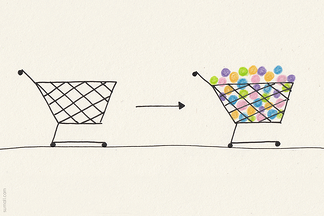Topics:
Lead GenerationSubscribe now and get the latest podcast releases delivered straight to your inbox.
 If you asked 50 people why they are best friends with the person that they are, it's likely that you'd uncover an underlying theme.
If you asked 50 people why they are best friends with the person that they are, it's likely that you'd uncover an underlying theme.
While many would argue that opposites attract, more than often we tend to cling to people who feel familiar; people who "get us."
When it comes to customer acquisition, brands who strive to recreate the familiarity you feel from a relationship with an old friend will see the most success. Carrying out content and interactions around the wants and needs of your ideal customers works to set your brand apart from the masses, while contributing to your ability to deliver the results they expect.
Basing your marketing efforts off of a loose concept of what you think your customers want and need won't fly. In order to truly resonate, you must nail down their wants and needs with certitude.
It's safe to say that mind reading is out of the question, which is why we've worked out 4 data sources where you can find the information you need to inform your marketing efforts and improve your customer acquisition.
Competitor Testimonials and Reviews
One of the most underutilized sources for insight into your customer's wants and needs lies within your competitor's testimonials. While your aim should not be to attempt to mirror their successes and tactics verbatim, their customer reviews and testimonials contain valuable information that can be used to formulate unique solutions for potential customers.
What do their reviews reveal about what's working? Are there obvious unmet needs? Are these unmet needs something that you can capitalize on?
Competitor reviews and testimonials bring to light reasons for satisfaction that you may not have thought of on your own. These clues can be used to help your brand improve the steps you take and the information you put forth in an attempt to acquire new customers.
Additionally, they have the ability to reveal areas where customers felt a disconnect with the brand, which ultimately resulted in a negative review. From reviews like these, you can extract problem areas which you can aim to avoid when it comes time to streamline your customer acquisition strategy.
Social Media
Social media is undoubtedly one of the most valuable avenues when it comes to improving your customer acquisition strategy. Turning a loyal Twitter follower into an actual paying customer is viable possibility, however you must unlock the correct approach in order to do so successfully.
Your potential customers aren't on social media platforms like Facebook looking to be bought and sold. If you want to be heard by your potential customers on a platform of this nature you have to play by the rules of the landscape. Tell a story, be engaging, and speak to their needs, but whatever you do, don't pitch.
While participating on social media platforms is a critical element when it comes to customer acquisition, it's only half the battle. Listening on social media is what will truly help you extract value.
Acts like monitoring specific hashtags on Twitter, or reviewing posts and status updates from your potential customers on Facebook will help you to identify pain points, areas of interest, and opportunities for you to provide solutions.
Past Behavior
How have people reacted to your content in the past?
If you've generated a well-rounded content library it is easy to revisit your past work and pull out information about the way
Metrics like page views, open rates, likes, and retweets can serve as good indicators of whether or not your content resonated well with your intended audience.
Once you uncover the content that performed well, you can siphon out information about the structure you used, the headline arrangement, the subject matter, the angle, or the imagery used to gain a more justified understanding of why it worked. In terms of customer acquisition, you want to recreate articles that people clicked and shared a lot because it's likely that the topic spoke to one of their needs. The more content you have that address their needs, the more likely they'll be to keep coming back for more, which ultimately eases the acquisition process.
Don't be afraid to rework or revisit concepts that your audience has found engaging in the past, as it's likely that they are will continue to see the value in complementary content. The evidence that your past content has left you with is an asset, and if you're looking to improve customer acquisition, it's a great place to start looking for insight.
Feedback
In order to gain a clear picture of what's going on inside your customer's minds don't be afraid to simply ask.
Customer feedback straight from the source serves as a highly effective way to determine what it is that you're doing write, as well as what you could be doing a lot better.
Surveys work to your advantages because they are both easy to implement and easy to analyze. They serve as a source for uncovering satisfaction rates, information on customer experience, and insight into customer expectations.
Aside from surveys, feedback boxes on the pages of your website serve as a great way to encourage visitors to contribute their concerns, questions, and comments with little to no effort. I think that often times we may find that something particularly annoys us about a brand's website, I can't we bothered to find a contact address and reach out to them. What a feedback box does is it puts in place a more structured process which provides visitors with easy access to submit their thoughts.
The more feedback you generate, the stronger your customer acquisition strategy will be.


Order Your Copy of Marcus Sheridan's New Book — Endless Customers!

